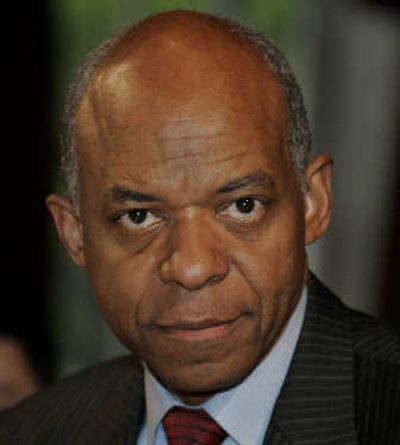Court says FBI was wrong in seizing lawmaker’s files

WASHINGTON – The judicial branch offered the executive branch a civics lesson Friday: The Justice Department can’t rifle through a congressman’s legislative documents, even if it suspects a crime.
A federal appeals court sided with Rep. William Jefferson and ordered authorities to return any congressional documents the FBI seized during its raid on his Capitol Hill office last year.
While looking for evidence of bribery, investigators reviewed all Jefferson’s documents, including legislative records. The three-judge court panel unanimously ruled that was unconstitutional.
The Bush administration has predicted such a ruling will turn Congress into a haven where lawmakers can keep evidence of corruption off-limits to prosecutors.
But the judges said the Justice Department went too far. The Constitution prohibits the executive branch from using its law enforcement powers to interfere with the lawmaking process.
The raid was part of a 16-month international bribery investigation of Jefferson, who is accused of accepting $100,000 from a telecommunications businessman, $90,000 of which was later recovered in a freezer in the congressman’s Washington home.
Jefferson pleaded not guilty in June to charges of soliciting more than $500,000 in bribes while using his office to broker business deals in Africa.
The U.S. Court of Appeals for the District of Columbia Circuit ruled that, while the raid itself was constitutional, the FBI crossed the line when it viewed every record in the office without allowing Jefferson to argue that some involved legislative business.
“The review of the congressman’s paper files when the search was executed exposed legislative material to the executive” and violated the Constitution, the court wrote. “The congressman is entitled to the return of documents that the court determines to be privileged.”
The court did not rule whether, because portions of the search were illegal, prosecutors should be barred from using any of the records in their case against Jefferson. That will be decided by a Virginia federal judge presiding over the criminal case, which is scheduled for trial in January.
Defense attorney Robert Trout said that fight is ahead. He accused the government of “overreaching” in its investigation.
“This was an illegal search,” Trout said. “And anything they got, privileged or not, was unlawfully obtained.”
The Justice Department said Friday it was pleased prosecutors were allowed to keep records unrelated to legislative business. Spokesman Brian Roehrkasse said the department was disappointed, however, because the ruling required authorities to notify lawmakers before any raid.
The court did not require lawmakers to receive advance notice of the FBI’s arrival. Rather, the court said the Justice Department can’t broadly review legislative records.
One solution mentioned in the opinion was for FBI agents to lock down the office, then allow the lawmaker to set aside disputed documents. It would be up to a judge – not the FBI – to decide whether the records could be seized.